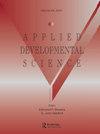青少年罪犯青少年发展过程中心理社会成熟度对法律社会化的影响
IF 1.7
3区 心理学
Q3 PSYCHOLOGY, DEVELOPMENTAL
引用次数: 0
摘要
摘要这项研究,使用了一个来自逃学途径研究的青少年罪犯样本(N = 1354),研究了Greenberger和Sorensen的“心理社会成熟度”模型,该模型是青少年发展过程中法律社会化(法律犬儒主义和合法性)的预测因素,以及这种关系随年龄的不同重要性。从14岁到25岁,心理社会成熟度显著预测了法律犬儒主义的程度较低,但合法性的水平也较低。然而,当按年龄考虑这些关系的显著性时,研究结果表明,随着青少年罪犯的年龄增长,心理社会成熟度和合法性之间的关系可能几乎没有变化,但在成年后的发展过程中,心理社会熟度在解释法律犬儒主义模式方面的显著性随着年龄的增长而下降。讨论了这项工作对有希望的干预措施的潜在影响,这些干预措施可以促进青春期早期的心理社会成熟,以减少冒犯或有冒犯风险的年轻人的法律冷嘲热讽。本文章由计算机程序翻译,如有差异,请以英文原文为准。
The age-graded effects of psychosocial maturity on legal socialization across the adolescent developmental course in youth offenders
Abstract This study, using a sample of youth offenders from the Pathways to Desistance Study (N = 1354), examines Greenberger and Sorensen’s model of “psychosocial maturity” as a predictor of legal socialization (legal cynicism and legitimacy) across the adolescent developmental course, as well as the differential importance of this relationship by age. Psychosocial maturity significantly predicted lower levels of legal cynicism, but also lower levels of legitimacy, from ages 14–25. Yet, when considering the salience of these relationships by age, results suggest that the relationship between psychosocial maturity and legitimacy may show little variation as adolescent offenders age, but that the salience of psychosocial maturity on explaining patterns of legal cynicism declines with age during development into emerging adulthood. This work’s potential implications for promising interventions that foster psychosocial maturity in early adolescence to reduce legal cynicism of youth who have offended or are at high-risk of offending are discussed.
求助全文
通过发布文献求助,成功后即可免费获取论文全文。
去求助
来源期刊

Applied Developmental Science
PSYCHOLOGY, DEVELOPMENTAL-
CiteScore
12.00
自引率
2.60%
发文量
23
期刊介绍:
The focus of this multidisciplinary journal is the synthesis of research and application to promote positive development across the life span and across the globe. The journal publishes research that generates descriptive and explanatory knowledge about dynamic and reciprocal person-environment interactions essential to informed public dialogue, social policy, and preventive and development optimizing interventions. This includes research relevant to the development of individuals and social systems across the life span -- including the wide range of familial, biological, societal, cultural, physical, ecological, political and historical settings of human development.
 求助内容:
求助内容: 应助结果提醒方式:
应助结果提醒方式:


